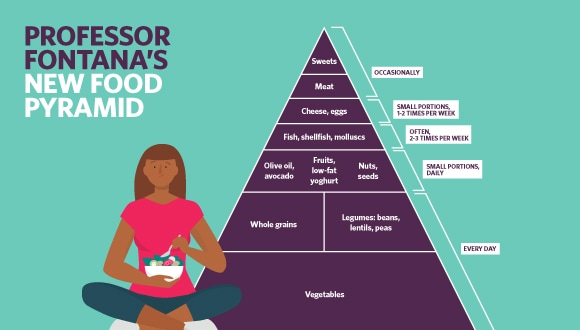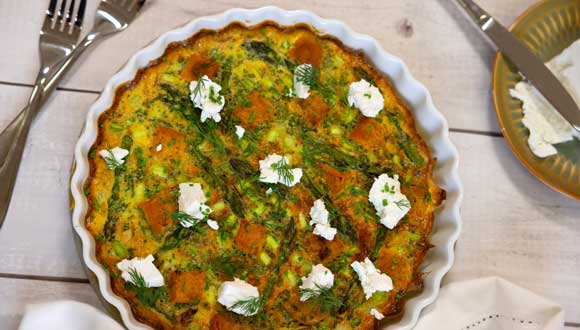Asparagus and pumpkin frittata with goat’s curd
Published April 2025 | 5 min read
Expert contributor: Professor Luigi Fontana, Scientific Director, CPC RPA Health for Life Program, University of Sydney
Words by Trudie McConnochie
This delicious plant-based recipe is so quick and easy to prepare, it’ll fast become a family favourite.
Eating more plant foods is a great place to start when it comes to living a long, healthy life. There’s evidence a diet rich in plant-based foods can lower your risk of heart disease, type 2 diabetes and some cancers when compared to an omnivorous diet (a diet which includes both plant foods and animal products). In fact, one 2020 study found that people who swapped just 3% of their diet from animal protein to plant protein sources reduced their chances of premature death over time by up to 5%. In particular, replacing eggs and red meat with plant proteins appeared to reduce death risk by as much as 24%.
Plant-based eating means a diet that’s mostly made up of fruits, vegies, whole grains, seeds, nuts and legumes, but can still involve small amounts of meat, eggs and dairy if you like – which makes it a good option if going totally vegetarian or vegan doesn’t work for you.
Choosing plant-based foods
To adopt a diet that’s big on plant-based foods, longevity expert and author Professor Luigi Fontana from the University of Sydney says to load up your shopping trolley with:
- legumes (like beans, lentils and chickpeas)
- whole grains (like brown rice, quinoa and wholegrain breads)
- dried herbs and spices
- extra virgin olive oil
- nuts
- seeds
- fruit
- vegetables.
Steer clear of ultra-processed foods, like chips, instant noodles, biscuits and some ready-made meals. Plant-based meats can be heavily processed, too, he adds.
“Often, these foods include added sugars, saturated fats and salt, as well as stabilisers and preservatives to enhance flavour, texture and shelf life,” he explains. “These ingredients can contribute to health concerns if consumed in large amounts.”
Getting enough protein with plant food
One of the biggest misconceptions about plant-based eating is that it means a diet lacking protein, says Prof Fontana. Protein contains the amino acids we need to maintain muscles, bones and immunity, and many people get their recommended protein intake easily from meat, dairy and eggs.
On average, women need around 46g of protein a day, and men need 64g. For those aged over 70, this increases to 57g for women and 81g for men. To put that in meal terms, 100g of cooked lean meat has around 30g of protein, or on a plant-based diet:
- 100g tofu = 10g protein
- 30g raw nuts = 8g protein
- 75g chickpeas = 5g protein
- ½ cup quinoa = 4g protein
- ½ cup cooked rice = 3g protein.
Prof Fontana recommends combining whole grains and legumes in meals throughout the day. Since they contain different types of amino acids (the building blocks of proteins), the combination will help support your protein needs.
“When combined, such as in a meal of brown rice and lentils or durum-wheat pasta with chickpeas, these plant foods provide a complete protein profile – equivalent to the protein found in eggs or meat,” he says.

The new food pyramid
As you’d expect, vegetables play a huge role in a plant-based diet. Prof Fontana regards them as so integral to healthy eating for longevity that he has put them at the base of his updated food pyramid.
While the original food pyramid for nutrition showed us foods to eat ‘most’, ‘moderately’ or in ‘small amounts’, Prof Fontana has created a new food pyramid that’s more specific about how often to eat from healthy food groups. He recommends eating:
- vegetables, whole grains and legumes – every day
- olive oil, avocado, fruit, low-fat yoghurt, nuts and seeds – every day (in small portions)
- fish and seafood – two to three times a week
- cheese and eggs – one to two times a week (in small portions)
- meat and sweets – occasionally.
Getting started with plant-based eating
If you’re looking to up your intake of plant-based foods, here are Prof Fontana’s tips for easy ways to get started:
- Snack on a handful of nuts: “You can also add nuts and seeds to salads or blend them into smoothies, sauces and dips.”
- Try chia seeds: Add them to your breakfast and you’ll feel fuller for longer, he says. “They are one of the best plant-origin sources of omega-3 fatty acids [usually found in fish and seafood] and are a rich source of calcium, phosphorous, zinc and copper.”
- Use good-quality olive oil: Especially when roasting, in dressings or drizzled over vegetables – but in moderation. However, Prof Luigi adds, using good quality olive oil won’t help you manage your weight if you’re not doing enough exercise or eating too much of it.
This recipe from Prof Fontana’s book, Plant Power: The Essential Plant Food Guide to Enrich Your Health, is a quick, family-friendly meal to introduce into your week. It’s packed full of vegies and is great for leftovers.

Asparagus and pumpkin frittata with herbs and goat’s curd
Prep time: 20 minutes
Cooking time: 20 to 30 minutes
Serves: 4
Ingredients
- 250g pumpkin, peeled and cut into 2½cm cubes
- 1½ tbsp extra virgin olive oil (plus extra for brushing)
- 10 asparagus spears
- 10 large eggs
- 100ml low-fat milk
- 1 tbsp chopped dill
- 1 tbsp chopped chives
- 1 tbsp chopped tarragon
- 60g goat’s curd or cheese
- Salt and pepper to taste
Method
- Preheat the oven to 180°C. Place the pumpkin on a lined baking sheet and season with salt, pepper and 1 tablespoon of olive oil. Bake for 15 to 20 minutes or until cooked through. Remove from the baking sheet and allow to cool.
- Meanwhile, prepare the asparagus. Peel the lower half of each spear, then trim 1cm from the base and discard it. Place the asparagus on the baking sheet and season with salt, pepper and remaining ½ tablespoon of olive oil. Bake for 5 to 10 minutes or until the asparagus are just slightly undercooked. Remove from the oven. Once cool enough to handle, chop each asparagus stem into two or three pieces, leaving the tips whole.
- Whisk the eggs and milk in a large bowl and season well. Stir through the herbs.
- Brush the inside of a 25cm pie dish with olive oil and place in the oven to preheat.
- Pour the egg mix into the hot dish and distribute the pumpkin and asparagus evenly on top, pressing them in a little. Crumble the goat’s cheese on top. Bake until just set, about 20 to 30 minutes depending on the size of the pan. If necessary, finish cooking using the grill function to colour and set the top of the frittata.
This is an edited extract from Plant Power: The Essential Plant Food Guide to Enrich Your Health by Professor Luigi Fontana, MD, PhD, published by Hardie Grant Books. Recipe photography by Marzio Lanzini.
A little support for healthy families
If you need a little inspiration for healthy meals your family will love, eligible HCF members can get free or discounted access to the evidence-based CSIRO Total Wellbeing Diet*. Created by Australia’s national science agency, it combines a higher protein, low-GI eating plan with exercise and proven weight management tools to help improve habits and create lifelong positive behaviours.
More Recipes
6 plant-based protein options to add to your diet
Plants can be a heart-healthy way to add nutrients to your diet. Here’s how to include plant-based protein meals into your daily routine with a little planning.
High-fibre recipes for reducing menopause symptoms
Eating more soluble fibre can play a big role in reducing menopausal symptoms. Adding fibre to your diet is easy with these recipes.
Best foods to help you live longer: 3 delicious recipes
Experts agree that eating healthily can help increase our life span. Try these three recipes to harness the power of nutrition to promote longevity and vitality.
Foods to boost the immune system
Include these nine immune-friendly foods in your diet during the cooler months to give your body the best chance of keepings colds and flu at bay.
IMPORTANT INFORMATION
* Receive a 20% discount on the CSIRO Total Wellbeing Diet 12 Week Program with eligible extras cover or through HCF Thank You, or free access to the CSIRO Total Wellbeing Diet 16 Week Program, if you have hospital cover and meet clinical and other eligibility criteria. For full terms and conditions, see hcf.com.au/csiro-total-wellbeing-diet
This communication contains information which is copyright to The Hospitals Contribution Fund of Australia Limited (HCF). It should not be copied, disclosed or distributed without the authority of HCF. Except as required by law, HCF does not represent, warrant and/or guarantee that this communication is free from errors, virus, interception or interference. All reasonable efforts have been taken to ensure the accuracy of material contained on this website. It’s not intended that this website be comprehensive or render advice. HCF members should rely on authoritative advice they seek from qualified practitioners in the health and medical fields as the information provided on this website is general information only and may not be suitable to individual circumstances or health needs. Please check with your health professional before making any dietary, medical or other health decisions as a result of reading this website.